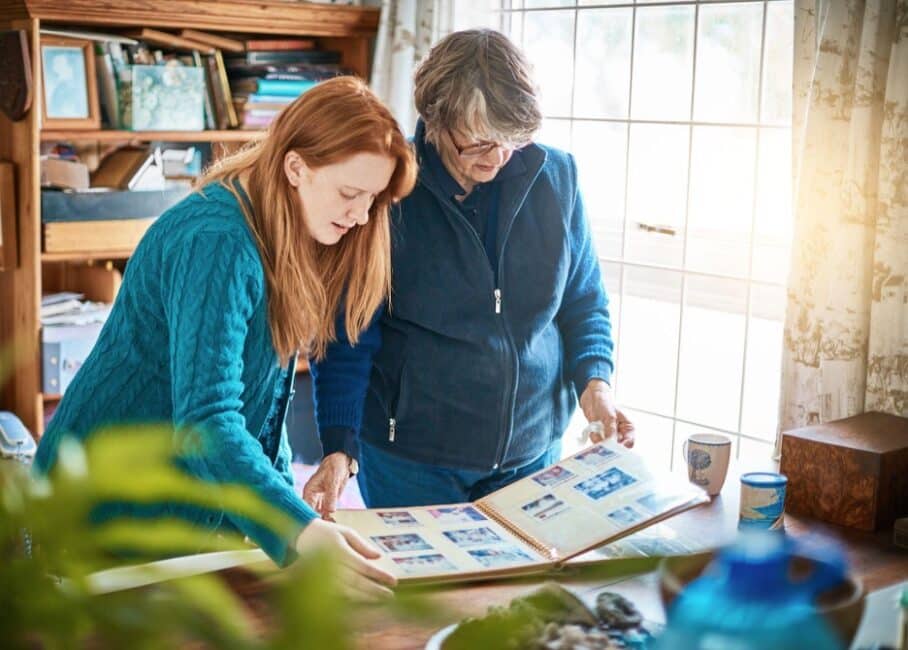How To Help Someone with Dementia: Guidance for Families

When someone you love is diagnosed with dementia, the ground shifts beneath you. Suddenly, everyday moments feel different. Conversations change. Even simple routines take more energy.
If you’re a dementia caregiver or family member trying to figure out how to help someone with dementia, please know this: You’re not alone. And you’re not expected to have all the answers.
At Cascade Living Group, we’ve had the privilege of walking alongside so many families navigating this path. Each journey is different – no two experiences with dementia care are the same. But what they all have in common is love, patience with dementia patients, and a deep desire to bring comfort and dignity to the person at the heart of it all.
We’re here to help with gentle guidance – not just for your loved one, but for you, too.
Small Routines, Big Comforts
One of the most helpful things you can do early on is establish a gentle daily rhythm. Dealing with dementia often brings confusion and anxiety, but a steady routine offers a sense of calm. Start simple:
- Wake up and go to bed at the same time each day.
- Plan meals, medications, and rest breaks around consistent times.
- Keep favorite clothing nearby to make dressing easier.
- Guide gently when it comes to bathing and grooming.
- Encourage water and small, balanced meals – even a favorite snack can be a bright spot in the day.
It’s not about doing everything perfectly. It’s about building predictability into a world that can often feel unpredictable.
When Words Get Difficult, Love Still Speaks
As Alzheimer’s care and dementia progress, communication can become one of the hardest hurdles. You may notice your loved one struggling to find words, or repeating themselves, or confusing people and places. It can be heartbreaking, but connection is still possible. Here are some helpful tips that can make communication easier.
- Speak slowly and clearly.
- Make eye contact.
- Use short sentences and a warm tone.
- Avoid correcting them or saying things like, “Don’t you remember?”
- Meet them where they are.
- Let them feel safe in the conversation, even if it’s not entirely grounded in reality.
- Most of all – be patient.
If words still fall short, a photo album, a favorite song, or a familiar object can help speak volumes and enhance connection.

Understanding the Emotional Ups and Downs
It’s normal for people with dementia to experience mood swings, fear, or even anger. These moments can be painful to witness, but try to remember: It’s not personal. It’s the disease.
When those harder moments come:
- Try to validate how they’re feeling, even if their reality doesn’t match yours.
- Avoid confrontation.
- Gently redirect if needed.
- Keep comforting items nearby – a favorite blanket, a pet, a scent they love. These little things can bring comfort.
If you ever find yourself losing your own patience with dementia patients, please don’t feel guilty. It’s okay to feel overwhelmed. This work takes a tremendous amount of heart.
Keep Doing Things With Them, Not Just for Them
Just because someone is living with dementia doesn’t mean they can’t still enjoy life. In fact, finding ways to stay engaged can boost their well-being – and yours, too.
Caregiving for dementia and Alzheimer’s is about more than managing symptoms. It’s about nurturing joy.
Music is incredibly powerful. So is time outdoors, folding laundry together, looking through old photo albums, doing a puzzle, or painting with watercolors. Break tasks into smaller steps if needed. The key is to focus on what they can do, how to adapt what they can’t do, and ways to bring them joy.
It’s not about doing a lot. It’s about creating moments of connection – even if they’re short and simple.
Make the Home Feel Safe
When someone is dealing with dementia, the home environment plays a huge role in keeping them secure. Small changes can make a big difference.
- Clear the floors of tripping hazards like loose rugs or cords.
- Install grab bars in the bathroom.
- Use nightlights to help them navigate in the dark.
- Lock away anything sharp or dangerous.
- Consider labeling rooms with signs or pictures.
- Find peace of mind with door alarms or medical alert systems – especially if wandering is a concern.
If these changes feel difficult to handle, it’s important to remember that you’re doing the best you can to care for dementia patients. Safety is love in action.
Don’t Forget About You
Being a carer for dementia is one of the most meaningful things you’ll ever do – but it’s also exhausting. Please, please take care of yourself along the way.
That means taking breaks. Accepting help. Eating well. Getting rest. Talking to someone who understands. Caregiver support groups – both local and online – can be a lifeline.
And if you ever feel like it’s time to explore outside support, whether it’s respite care, adult day programs, or full-time dementia care, you haven’t failed. You’re being wise. You’re protecting your own well-being so you can keep showing up with love.
Here’s a helpful guide if you’re exploring memory care communities.

Thinking About What’s Ahead
As hard as it is, one of the kindest things you can do is talk early about future needs. Discussing care preferences, financial planning, and legal documents like power of attorney while your loved one can still participate empowers everyone. Keep emergency contacts and medical info in one easy-to-find place. Research options together – whether that’s in-home support, an adult day center, or a memory care community.
If you’re unsure how to deal with dementia in a parent, these conversations can ease uncertainty later.
Planning ahead is a gift. It gives your loved one a voice in their own care and gives you peace of mind down the road.
You’re Not Alone. Really.
There’s so much support out there for families navigating dementia care. Organizations like the Alzheimer’s Association, the National Institute on Aging, and local Area Agencies on Aging offer resources, education and helplines.
If you’re wondering how to get a dementia diagnosis, these organizations can also guide you through the first steps.
At Cascade Living Group, We’re Here for You, Too
Whether you’re just starting to wonder about a diagnosis or you’ve been walking this road for a while, we can help you explore what care for dementia patients might look like – now and in the future. Learn more about our approach to Alzheimer’s care and dementia support.
If you ever need someone to talk to or want to learn more about how we can support your family, we’re here. Let’s walk this journey together.


